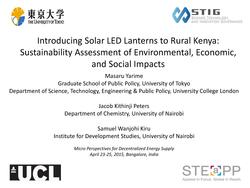The printable version is no longer supported and may have rendering errors. Please update your browser bookmarks and please use the default browser print function instead.
Introducing Solar LED Lanterns To Rural Kenya: Sustainability Assessment of Environmental, Economic and Social Impacts
Presenter: Masaru Yarime, Jacob Kithinji Peters and Samuel Wanjohi Kiru
Presentation
| This paper examines the impacts of the introduction of solar LED lanterns on in rural Kenya on environmental, economic, and social dimensions of sustainability. A survey was conducted on the use of the solar lanterns in households, compared with these households without solar lanterns. It shows that the solar lanterns had made some positive impacts with regard to reducing kerosene consumption, thereby expenditures for purchasing it and CO2 emissions, improving health conditions, and increasing time for doing homework for children at home, therefore contributing to moving towards sustainability. There remain many challenges, however, including provision of necessary finance, robust business models, viability of local cooperatives, and the establishment of supply chains for product delivery and maintenance from a long-term perspective.
|

|
References
Masaru Yarime, Jacob Kithinji Peters and Samuel Wanjohi Kiru: Micro Perspective for Decentralized Energy (MES) 2015, Bangalore, India.





















